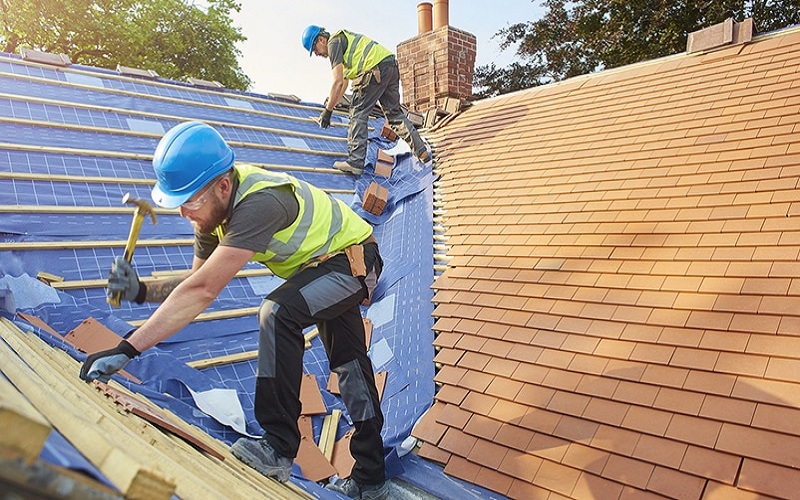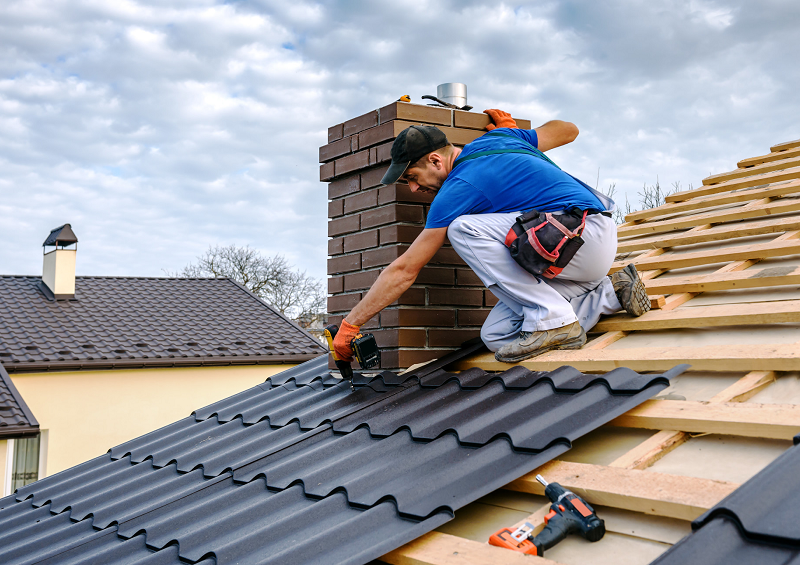Roof repairs can be significant for homeowners, often requiring careful planning and attention to detail. Amidst the excitement of selecting roofing materials and hiring a reputable contractor, paying attention to the essential aspect of obtaining the necessary permits is crucial. In this comprehensive guide, we aim to demystify the permit process for roof repairs, ensuring that you are well-equipped to navigate the regulatory requirements that govern such projects. By understanding why permits are essential, exploring the various types you may need, and delving into the crucial task of researching local regulations, you’ll gain the knowledge and confidence necessary to successfully tackle your roof repair project.
When considering trusted new roof installation or replacement services, Atlas Roofing emerges as a beacon of excellence in the following areas:
Trusted new roof installation in Los Angeles, CA
Exceptional new roof installation in Santa Clarita, CA
Top-grade new roof installation in Glendale, CA
Reliable new roof installation in North Hollywood, CA
Atlas Roofing’s seasoned professionals guide you through the permitting intricacies and ensure a seamless transition from the paperwork to the actual installation, making them a go-to choice for homeowners navigating the challenges of roof repairs.
In the course of securing permits for your upcoming project, it’s imperative to partner with a roofing company that not only understands the intricate permit process but also offers reliable and top-notch installation services.
By understanding why permits are essential, exploring the various types you may need, and delving into the crucial task of researching local regulations, you’ll gain the knowledge and confidence necessary to successfully tackle your roof repair project.
Preparing Your Permit Application
Gathering Required Documentation
Before diving into the permit application, gathering all the necessary documentation is essential. Start by identifying the documents your local authorities require for roof repair permits, such as architectural plans, engineering drawings, proof of insurance, and homeowner association approvals. Ensure you have these documents ready and organized to streamline the application process.
Completing the Application Forms
Once you have your documentation in order, it’s time to complete the application forms. Pay close attention to the details and follow the instructions carefully. Only accurate or complete applications can lead to delays or even rejection. Double-check that you’ve provided all the requested information and signatures while keeping in mind that precision is critical.
Timelines and Processing
Understanding the timelines involved in the permit application process is crucial. It can vary depending on your location and the complexity of the project. Research the average processing times for roof repair permits in your area and plan your project timeline accordingly. Remember that delays in obtaining permits can affect your overall project schedule, so it’s wise to factor in some buffer time.
Navigating Potential Challenges
Dealing with Neighborhood Concerns
Sometimes, your neighbors may have concerns or objections regarding your roof repair project. It’s essential to address these concerns diplomatically. Open lines of communication can go a long way in resolving issues. Consider holding a neighborhood meeting to discuss your plans, address any questions or worries your neighbors may have, and work together to find solutions that benefit everyone.
Environmental Considerations
Roof repair projects may involve materials and practices that have environmental implications. Ensure you are aware of local environmental regulations and take the necessary steps to minimize the impact of your project. This might include proper disposal of old roofing materials or using eco-friendly roofing materials and practices to reduce your project’s ecological footprint.
Overcoming Unexpected Delays
Despite careful planning, unexpected delays can still occur during the permit process. It could be due to a backlog in the permitting office or unforeseen circumstances. Be prepared for these setbacks by building some flexibility into your project schedule, allowing you to adapt and adjust as needed without compromising the quality of your roof repair project.
The Inspection Process
Scheduling Inspections
Once you have obtained your permit and commenced your roof repair project, you must schedule inspections at various stages. These inspections ensure that your work complies with local building codes and regulations. Keep a close eye on your project timeline, coordinate inspections accordingly to avoid unnecessary delays, and communicate effectively with the inspection authorities.
Passing Inspections
Passing inspections is a critical step in the roof repair process. To increase your chances of success, familiarize yourself with the specific requirements your local authorities will check during inspections, such as structural integrity, safety measures, and adherence to local codes. Ensure that your contractor is well-informed and experienced in meeting these standards, assuring a smoother inspection process.
Handling Non-Compliance Issues
If your project does not meet the required standards during an inspection, don’t panic. Address the issues promptly by working closely with your contractor to make necessary corrections. Remember that resolving non-compliance matters may result in additional inspections, so staying patient and committed to achieving compliance is vital, collaborating effectively with your contractor to resolve any issues is critical.
Staying Informed and Compliant
Keeping Records
Throughout your roof repair project, maintain meticulous records of all permits, inspections, and project-related documents. This documentation will serve as evidence of compliance and can be invaluable if any disputes or questions arise during or after the project. Organized and thorough record-keeping will ensure you have all the necessary documentation readily available.
Renewing Permits
Depending on the duration of your project, permits may need to be renewed. Keep a calendar with renewal dates and submit the necessary paperwork well in advance to avoid disruptions to your project timeline. Proactive planning and attention to permit renewal dates will help you keep your project on track and compliant with local regulations.
Adapting to Changes in Regulations
Building codes and regulations can evolve over time. Stay informed about changes or updates to local building regulations that may impact your project. Your contractor should also be well-versed in current building codes to ensure your project remains compliant, ensuring that you stay ahead of any regulatory changes that could affect your roof repair project’s requirements.
Ensuring a Smooth Roof Repair Experience
Communication with Your Contractor
Clear and open communication with your contractor is critical to a successful roof repair project. Discuss expectations, timelines, and any concerns you may have upfront. Regular updates and a strong working relationship can help avoid misunderstandings and keep your project on track, ensuring that you and your contractor are on the same page throughout the process.
Post-Project Cleanup and Inspection
Once your roof repair project is completed, remember the post-project cleanup. Ensure that the job site is thoroughly cleaned and all debris is removed. Schedule a final inspection to confirm that everything meets the necessary standards before considering the project complete. A meticulous cleanup and a final inspection will leave you with peace of mind, knowing that your roof repair was executed to the highest standards.
Feedback and Reviews
Providing feedback on your contractor’s performance and leaving reviews can benefit both you and future customers. Honest feedback helps contractors improve their services, and positive reviews can help others in your community make informed decisions when choosing a contractor for their roof repair needs. Sharing your experience and insights with others contributes to a more robust, more transparent roofing services industry.
In conclusion, navigating the permit process for roof repairs may seem daunting. Still, with careful planning, clear communication, and a commitment to compliance, you can ensure a smooth and successful project. Remember to stay informed about local regulations, maintain records, and work closely with your contractor to achieve the desired results. By following these guidelines and enhancing your understanding of each step, you’ll be well-prepared to tackle your roof repair project with confidence and expertise.
Publisher’s Details:
[Natural Linking Opportunities]
[iframe]
Come as he offers his talent and style.


